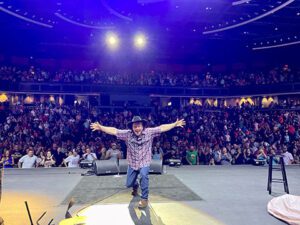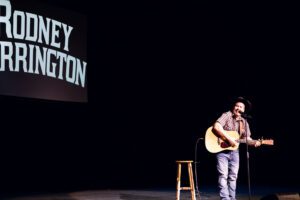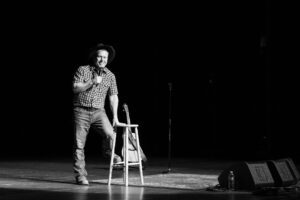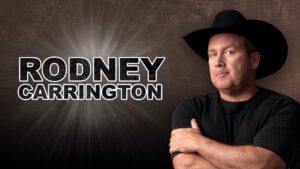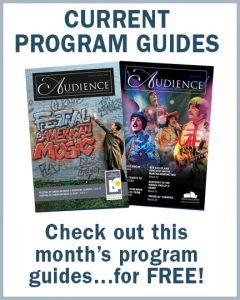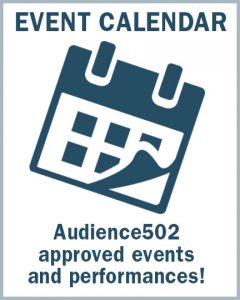When it comes to the great comedians over the years, names like Richard Pryor, George Carlin, Robin Williams, Rodney Dangerfield and Eddie Murphy come to mind. More modern names might include Chris Rock, Jim Gaffigan, Ron White, Jeff Foxworthy, Dave Chappelle and several others. Live comedy is something that has a long-standing history and a bright future and delivers audiences a personal experience based on how you interpret what they are trying to convey. Whatever the content might be, it all seems to fit the personality of the person who is delivering it with one goal in mind, to make their audiences laugh.
We recently caught up with one of the top comedians on tour today, Rodney Carrington, who has his own niche of great comedy, combined with songs that are cleverly written with topics that well, might just make you feel awkward depending on who you’re watching it with.
Nevertheless, his fans love him and we can’t wait to see him at Whitney Hall on March 24th. (Do your research before you go as the content might not be appropriate for younger audiences.)
Audience502 publisher, G. Douglas Dreisbach, caught up with him to find out more about his career and what fans can expect when he hits the stage in March.
Check out the full interview and get your tickets to his show at KentuckyPerformingArts.org
G. Douglas Dreisbach: Rodney, thank you for your time today, we are excited to catch up and hear what you’re up to. Your stand-up is unique in a way that you not only have a hilarious setup and delivery of jokes and content, but then you go for the knockout punch with your songs that are hilarious as well. When you were getting your start, what came first, the guitar or the comedy? And, when did you realize that traditional stand-up comedy mixed with music was going to be your niche and passion to ignite your career?
RC: The guitar came later out of boredom. When I was in my twenties, I was on the road and bought a guitar at a pawn shop, learned a few chords, and then just started writing little pieces of songs. Over time, the songs developed into longer ones, and it was simple as that. Early on, all I wanted to do was try to figure out how to entertain people and would have utilized just about anything. I didn’t have any sort of agenda outside of that.
GDD: When you realized the singing and guitar playing was well received by your fans, did you ever think about a mainstream singing career? Or did you always want to stay in the comedy genre?
RC: I never really considered singing for a living, because I felt like there were millions of people that already did that and only a few people were doing what I did that were successful. I really exceeded my own expectations but my whole life is also a product of lack of planning. I didn’t plan comedy. I didn’t plan anything. It just kind of came along. It was something I tried when I was 20 years old, and people laughed, and I saw it as a freedom. I saw it as a way to get out of East Texas and go do something that I was enjoying. When I was sleeping in my truck when I was in my 20s, you couldn’t have convinced me that I wasn’t living the greatest life. I guess I could look back and say it was a struggle, but it really wasn’t, it was a lot of fun and I still feel like that. I think the world’s a different place today than it was when I started and I don’t know how I’d start if I had to start today.
GDD: When you were growing up, grade school, high school and early career, were you always a funny guy and friends saying, “You should be a comedian when you grow up”? What was the “aha” moment when you realized you wanted to have a career in comedy?
RC: I took acting classes and theater in college and realized that people laughed at this play I was in. I asked the director, “Hey, why can’t we take this on the road?” He laughed. He said, “Son, you’re in college.” After that, the wheels just started turning, and I thought, “Well, what else is there?” There was an open mic night in East Texas where I lived and grew up, and I decided to give it a try and everyone laughed the first night I was there. So, then I spent the next couple of years trying to figure out what I did that first night. It wasn’t easy, I just hung in there and kept trying to figure it out. From then, I went anywhere and everywhere because back then, you could afford to go anywhere with gas at about 70 cents a gallon. Over the course of four to five years, I developed enough material and was performing at most of the bigger comedy clubs around the country. Soon after that came syndicated radio, then a record deal with Mercury, and eventually moved to Capitol, and then from that came TV and everything else. All the success that I had came from my success on the road, and a lot of guys would put together 15, 20, 30 minutes and move to California and hinge their whole career on whether or not they got a TV deal. I just thought that was like panning for gold. At that time there were four networks with four guys who ran them. I thought “I’m not going to let my whole life be determined by whether or not four people think I’m funny or not.” I wanted to build job security and longevity, so I set out to build an audience for myself. My thought was that there were 330 million people in the country. If I could just get a million people who really like what I do to give me $10 a year, every year, for the rest of their life, in the form of buying a tape, T-shirt, or a bumper sticker, I might be able to make a living at this. It was a simple plan and I treated it like I was running a business. I was just going on my own little path.
GDD: How did the growth of the Internet and social media contribute to growing your brand and exposing your content to so many people? Now you were appealing to 300 million people, versus 4 people trying to determine if you’re funny or not… it had to be a big break.
RC: Well, I think everything played a role. I don’t know to what degree the Internet had and I was never much of a social media person. They still have to drag me to get me to do anything on social media, because I can’t stand it, to be honest with you. I started during a time when cassette tapes were coming out. My first comedy album was on a cassette tape. So, I never really looked at there being any sort of transition into the Internet stage. There’s a lot of people out there that become known on YouTube and this and that, that have done it that way, I guess. I don’t know anything about it, and I don’t know to what degree it played any role.
For me, there wasn’t really one thing that made it happen. Any success I had was came from the success that I was having on the road, and the success that I was having on the road was coming out of my own efforts of selling. I’d go to some place and sell 10 cassettes, and then they’d go share it and those 10 people would share it with 10 of their friends, and it grew like that. It grew like a network, almost like network marketing. It was from a real grassroots place. And people that come to see me now are the people that were seeing me then, that discovered me in their 20s. Well, now they’re all older. We’re all in our 50s now and the people that I am seeing in the audiences have grown up with me, and I’ve grown up with them, and I have shared my life with them along the way.
GDD: How do you keep things fresh and find new content for your fans? And are you usually confident when you go onstage to try it for the first time?
RC: I haven’t been confident since I started. When I think of a story, or something that I’m going to tell, if it doesn’t seem funny within the first couple of lines, something is wrong. I’ve always felt that if you describe the story in a few lines, it’s probably not worth telling. But in the very beginning, when I was doing stand-up, I discovered that if I wrote something in letter form, like I was trying to make just one buddy of mine laugh, that there was something to it. If I was literally just saying, “Hey, Dear Doug, I’m on the road, blah, blah, blah,” and I just was writing you a letter, and my whole intent was to make you laugh, well, I discovered that that was the reality of what I was doing. I was writing letters to my friends, my buddies back home, and I’d send them to them, and they’d laugh at them. So those were really the kind of stories I started telling.
As time went on, my life evolved. I was married. I had kids. My comedy has always been a reflection of what was going on in my life at that particular time, and you could see that in my comedy.
But it is a different place to exist in the comedy world today. I don’t even know how a young guy would start out today. There are things I don’t recognize that are being proposed in this world now, but what I have going for me is that my fans have followed me all these years come from where I come from and they get me.
GDD: When you go on stage, do you have a script that you try to go with? How do you manage your onstage content flow? And is it the same throughout the tour?
RC: I always ask myself, and others, “How am I going to start tonight?” But it doesn’t matter who I ask, my sound guy, Jay, or anybody else. I never really listen. I just kind of go out and just work off of what I’m given. I have a plan in place when I get out there. As far as the tour goes, it is funny when people talk about there being a tour. I started in 1989, and I have never quit. So, I don’t just tour and stop, and then wait a long time, and then tour again. I just keep going, and the show just evolves over time. It evolves at my convenience, in my timeframe. That’s how I’ve always operated. It gets to the point where I go, “OK, I’ve ran this particular story long enough,” and then I think I’ll feel like I’ll get somewhere else, and I start talking about something else, and then it just slowly evolves that way, slowly changes in that way. That’s how I’ve always worked.
GDD: Did you have any early mentors, supporters, or influencers, back in your early days and even today?
RC: No, I don’t watch comedy at all, because I do it for a living, and it doesn’t really define me or my life, either. I do it for a living, and I have, and I’m very grateful to have had this opportunity all these years, but my life is pretty simple. I come home and go to the grocery store and mow the yard, you know, figure out what else I’m going to do.
GDD: What can we expect and look forward to about your show here in Louisville on March 24?
RC: I would say that if you don’t know what I do, then you probably ought to go on the Internet and look around. It’s kind of like buying a car. You want to do your homework. Or just come! I don’t care. I don’t want to be the source of anybody’s misery. Some people will come and go, “Well, I just didn’t know what I was getting into.” Well, you should do your homework. What dumbass doesn’t read about where they’re going or doing or what car they’re buying before they take it off the line? I have no agenda except to make people laugh, and I’m content with just that.
So, I don’t know what to tell anybody what to expect. If they’ve never been to a stand-up show or anything, or a comedy show, or—if you come with expectations that you’re going to learn something, you’re going to be highly disappointed. If you just come with an open mind, and you want to have fun and laugh, then come on.
Quick Hits with Rodney Carrington:
Do you have any hobbies or things you do to kill time?
I think I am a 75-year-old man in my spirit. I get up just about every day and go for about an hour and a half, two-hour walk. Then I go down to the gym, when there’s a bunch of old fellows and we piddle around down there. Then sometimes I play golf or mow the yard. I do like to cook. It’s really quite boring. I mean, you’d think I lived at Whispering Pines Assisted Living Facility, to be honest.
Favorite Sports Teams?
I travel too much to really keep up with sports so no, I don’t have any sports teams. You know, when sports went to being all politicized, I quit watching. I don’t watch football for that reason. I don’t watch basketball. I don’t watch any of it. When all of the politics entered sports, I just quit altogether. I don’t care. I watch golf every now and then. I like golf.
Any favorite podcasts, shows or books you are reading?
Nope. If you come in my house and the TV is on, then I’ve died, and somebody turned it on. Sometimes I will listen to quiet music that probably has no words.
What are your favorite places to visit for vacation?
I travel so much that when I get home, home is a vacation. I think any time I’m in a hotel, it’s just like jail. So, the idea of coming home and planning some trip and going somewhere and getting in a hotel again would be like prison. So, I really do just enjoy being home.. As far as traveling, I’ve been to every single state. I’ve been all over Canada. And then I went all over Australia. They said, “Hey, we can’t wait for you to come back.” I said, “You better take a picture of me. I ain’t never coming back. It’s too far over here.” And it is. It’s halfway around the world.
Get tickets to the show on March 24 at KentuckyPerformingArts.org

